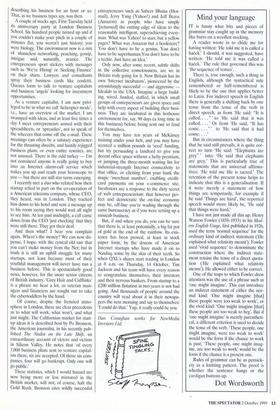Mind your language
IT is funny what bits and pieces of grammar stay caught up in the memory like burrs on a woollen stocking.
A reader wrote in to chide me for having written: 'He told me it is called a hadek.' I should, it was suggested, have written: 'He told me it was called a hadek.' The rule that governed this was 'the sequence of tenses'.
There is, true enough, such a thing in English, although the syntactical rule remembered or half-remembered is likely to be the one that applies better to Latin. For indirect speech in English there is generally a shifting back by one tense from the tense of the verb in direct speech, as from 'He said: "It is called..,." ' to 'He said that it was called.... ' Or from 'He said, "It has come.... " ' to 'He said that it had come.. .
But in circumstances where the thing that he said still prevails, it is quite cor- rect to turn 'He said: "Elephants are grey"' into: 'He said that elephants are grey.' This is particularly true of statements that are universal affirma- tives: 'He told me life is sacred.' The retention of the present tense helps to indicate that this is a generalisation. If it were merely a statement of how things are temporarily, for example if he said 'Things are hard', the reported speech would more likely be, 'He said that things were hard.'
I have not just made all this up. Henry Watson Fowler (1858-1933) in his Mod-
ern English Usage, first published in 1926, used the term 'normal sequence' for the ordinary kind of indirect statement ('He explained what relativity meant). Fowler used 'vivid sequence' to denominate the construction where the indirect state-
ment retains the tense of a direct quota-
tion ('He explained what relativity means'). He allowed either to be correct. One of the traps to which Fowler drew attention was the use of a phrase such as 'one might imagine'. This can introduce an indirect statement of either the nor- mal kind: 'One might imagine [that] these people were too weak to work', or the vivid kind: 'One might imagine [that] these people are too weak to beg'. But if 'one might imagine' is merely parentheti- cal, a different criterion is used to decide the tense of the verb. 'These people, one might imagine, were too weak to work' would be the form if the chance to work is past; 'These people, one might imag- ine, are too weak to work' would be the form if the chance is a present one.
Rules of grammar can be as pernick- ety as a knitting pattern. The proof is whether the sentence hangs or the cardigan buttons up.
Dot Wordsworth










































































 Previous page
Previous page